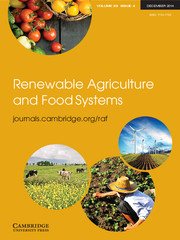Article contents
Effective mechanical weed control in processing tomato: Seven years of results
Published online by Cambridge University Press: 14 November 2013
Abstract
Open-air crops are important in Spanish horticulture. The limited number of herbicide active ingredients in minor crops, the waste problem of polyethylene (PE) plastic mulch and the high prices of biodegradable plastics leave hand-weeding and mechanical weed control as the most viable weed control methods. Different tools have been tested in northern European countries but their performance remains unknown in the edaphoclimatic situation of southern Europe. The objective of this work was to test novel physical weed control methods on processing tomato in northeastern Spain compared with other effective control methods, i.e., plastic and paper mulches. A first sequence of field trials was established from 2005 to 2008 at Zaragoza (Spain) to select the best physical control methods out of flamer, torsion weeder, finger weeder, flex-tine harrow and brush hoe used alone or in combination. The best method was the brush hoe which was then compared from 2009 to 2011 with PE mulch, biodegradable plastic mulch and paper mulch. Flamer, flex-tine harrow, torsion weeder and finger weeder performed quite irregularly due to crusty soil conditions and needed additional tools or repeated treatments to increase weed control efficacy. The brush hoe performed best in this soil situation working at about 5 cm depth. Weed biomass reduction was higher than 80% in 6 out of 7 years and similar yield was obtained in the brushed plots compared to the yield obtained with PE, biodegradable plastic and paper mulch. The brush hoe is thus a suitable option for weed control in processing tomato while the other tools were too weak to control aggressive summer weeds in the tested conditions.
Keywords
- Type
- Research Papers
- Information
- Copyright
- Copyright © Cambridge University Press 2013
References
- 9
- Cited by


